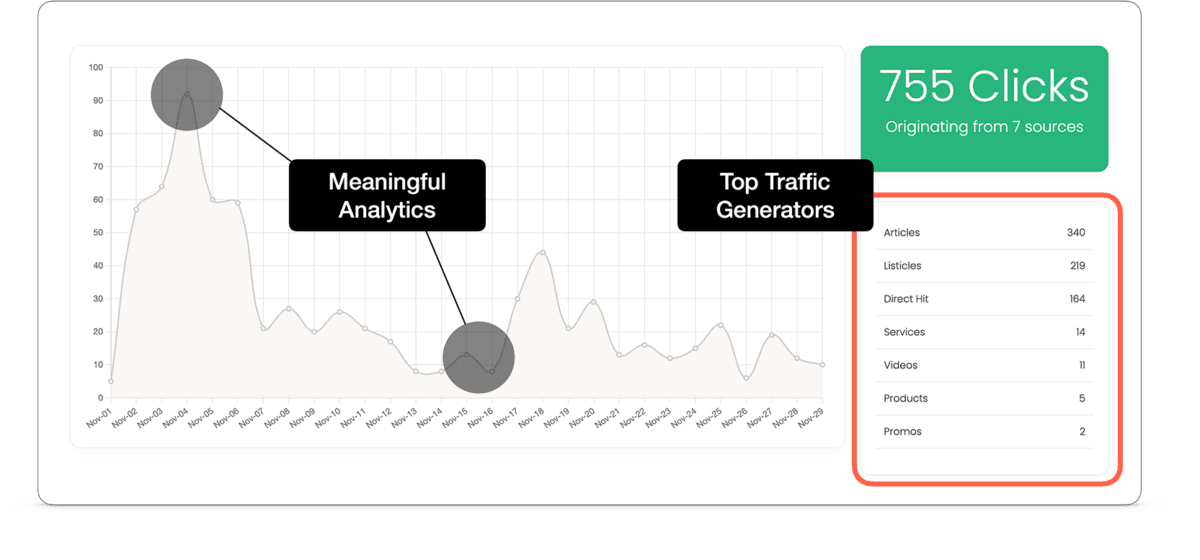Table of Contents
Small businesses often face challenges in maximizing their marketing efforts and achieving a significant return on investment (ROI). In this article, we delve into the crucial aspects of measuring small business content marketing ROI and provide valuable insights into how they can enhance their marketing strategies to achieve greater success.
Small businesses often face challenges in maximizing their marketing efforts and achieving a significant return on investment (ROI). It is crucial for small businesses to understand the importance of measuring content marketing ROI and how it directly impacts their overall success. By analyzing the performance of their content marketing initiatives, small businesses can make informed decisions to enhance their marketing strategies and ultimately achieve greater success.
Measuring content marketing ROI for small businesses involves tracking various metrics such as website traffic, lead generation, and conversion rates. Understanding these metrics allows small businesses to evaluate the effectiveness of their content and make necessary adjustments to improve their ROI. Additionally, by leveraging marketing automation and AI content creation platforms, small businesses can streamline their processes and optimize their content for better performance.
Furthermore, small businesses need to focus on creating high-quality, engaging content that resonates with their target audience. By producing valuable and relevant content, small businesses can build trust and credibility with their audience, leading to increased brand awareness and customer loyalty. This, in turn, contributes to a higher content marketing ROI and overall business success.
In conclusion, measuring small business content marketing ROI is essential for optimizing marketing efforts and achieving tangible results. By understanding the key metrics, leveraging advanced marketing tools, and prioritizing high-quality content, small businesses can enhance their marketing strategies and maximize their ROI, ultimately leading to greater success in the competitive online landscape.
Understanding the Significance of Measuring Content Marketing ROI for Small Businesses
Measuring content marketing ROI is crucial for small businesses as it allows them to gauge the effectiveness of their marketing efforts. By analyzing the return on investment, small businesses can identify which content marketing strategies are yielding the best results and which ones may need to be adjusted or discontinued. This data-driven approach enables small businesses to make informed decisions and allocate their resources more effectively, ultimately maximizing the impact of their marketing efforts.
Furthermore, measuring content marketing ROI helps small businesses to assess the impact of their content on revenue generation and online presence. This insight is invaluable as it allows small businesses to understand the correlation between their content marketing efforts and their bottom line. By understanding how their content contributes to revenue generation, small businesses can focus on creating and promoting content that drives tangible results, ultimately optimizing their marketing budget and resources.
Overall, understanding the significance of measuring content marketing ROI for small businesses is essential for maximizing their marketing efforts. By evaluating the impact of content marketing on revenue generation, online presence, and overall marketing effectiveness, small businesses can make data-driven decisions to enhance their content marketing strategies. This approach not only ensures that small businesses are investing their resources wisely but also helps them to continuously improve and refine their content marketing efforts for long-term success.
Utilizing Digital Marketing and Content Creation to Boost Small Business Revenue
Small businesses can utilize digital marketing strategies such as social media advertising, search engine optimization, and email marketing to expand their reach and attract potential customers. By leveraging these tools, small businesses can increase brand visibility and drive traffic to their website, ultimately leading to more sales and revenue growth.
In addition to digital marketing, content creation plays a crucial role in boosting small business revenue. By producing high-quality and relevant content, small businesses can position themselves as industry leaders and experts in their field. This can help build trust and credibility with their target audience, leading to increased customer loyalty and repeat business.
Furthermore, small businesses can use content creation to showcase their products or services in a compelling and informative way, helping to educate potential customers and drive purchase decisions. By consistently producing valuable content that resonates with their audience, small businesses can effectively drive revenue growth and business expansion.
Critical Questions to Ask
How can small businesses measure the success of their content marketing efforts?
Small businesses can measure the success of their content marketing efforts by tracking key performance indicators such as website traffic, engagement metrics, and conversion rates. By analyzing these metrics, small businesses can gain valuable insights into the effectiveness of their content and make data-driven decisions to optimize their marketing strategy for better ROI.
Additionally, implementing tools like Google Analytics and social media insights can provide detailed data on content performance, audience demographics, and behavior, enabling small businesses to refine their content marketing approach for maximum impact.
What role does social media advertising play in boosting small business revenue?
Social media advertising allows small businesses to target specific audiences based on demographics, interests, and behaviors, making it a powerful tool for reaching potential customers. By creating compelling ad content and using precise targeting, small businesses can increase brand visibility, drive traffic to their website, and generate leads, ultimately leading to revenue growth.
Moreover, social media advertising provides valuable data and insights into audience preferences and behavior, enabling small businesses to refine their marketing strategies and create more effective content that resonates with their target market.
How can small businesses leverage search engine optimization (SEO) to drive revenue growth?
Implementing SEO strategies such as keyword optimization, content quality, and link building can help small businesses improve their website’s visibility in search engine results, leading to increased organic traffic and potential customer acquisition. By ranking higher in search engine results pages, small businesses can attract more qualified leads and enhance their online presence, ultimately contributing to revenue growth.
Furthermore, SEO can help small businesses establish authority and credibility in their industry by creating valuable and relevant content that addresses the needs and interests of their target audience, ultimately driving customer engagement and loyalty.
What are the key benefits of email marketing for small businesses?
Email marketing allows small businesses to engage with their audience in a personalized and direct manner, delivering targeted content, promotions, and updates to nurture customer relationships and drive sales. By building an email list and segmenting subscribers based on their preferences and behaviors, small businesses can deliver tailored content that resonates with their audience, leading to increased open rates and conversions.
Moreover, email marketing provides valuable data on subscriber engagement, allowing small businesses to track performance metrics, optimize their campaigns, and drive revenue through effective email communication and lead nurturing.
How does content creation contribute to establishing small businesses as industry leaders?
Content creation allows small businesses to demonstrate their expertise, knowledge, and unique value proposition to their target audience, positioning themselves as industry leaders and thought authorities. By consistently producing high-quality and informative content that addresses industry trends, challenges, and solutions, small businesses can build trust, credibility, and brand authority, ultimately attracting and retaining loyal customers.
Additionally, content creation enables small businesses to showcase their insights, innovations, and success stories, establishing themselves as go-to resources for valuable information and expertise in their respective industry, ultimately contributing to revenue growth and business expansion.
How can small businesses effectively use content creation to educate potential customers and drive purchase decisions?
Small businesses can leverage content creation to provide valuable information, product demonstrations, and customer testimonials that educate and inform potential customers about their offerings, benefits, and competitive advantages. By creating compelling and informative content that addresses customer pain points and needs, small businesses can influence purchase decisions, build brand trust, and drive conversions.
Furthermore, content creation allows small businesses to tailor their messaging and storytelling to resonate with their target audience, effectively communicating the value and benefits of their products or services, ultimately contributing to revenue growth and customer acquisition.
What are the key considerations for small businesses when producing valuable and relevant content?
Small businesses should focus on understanding their target audience’s needs, preferences, and pain points to create content that is relevant, valuable, and engaging. By conducting market research, customer surveys, and competitor analysis, small businesses can gain insights into their audience’s interests and challenges, enabling them to produce content that addresses specific needs and provides solutions.
Moreover, small businesses should prioritize consistency, authenticity, and storytelling in their content creation efforts, ensuring that their messaging aligns with their brand identity and values, ultimately building brand trust, loyalty, and customer engagement for revenue growth.
How can small businesses ensure the ongoing success of their content marketing and revenue growth strategies?
Small businesses can ensure the ongoing success of their content marketing and revenue growth strategies by continuously monitoring and analyzing performance metrics, audience feedback, and market trends to adapt and optimize their content and marketing approach. By staying agile and responsive to changes in consumer behavior and industry dynamics, small businesses can refine their strategies, experiment with new content formats, and stay ahead of the competition to drive sustainable revenue growth and business expansion.
Furthermore, small businesses should prioritize building and nurturing customer relationships, leveraging customer feedback, and delivering exceptional customer experiences to drive repeat business, referrals, and long-term revenue growth through effective content marketing and customer engagement strategies.
Implementing Marketing Analytics for Small Business Success
Implementing marketing analytics is essential for small businesses to effectively measure the return on investment (ROI) of their content marketing efforts. By utilizing marketing analytics tools, small businesses can track key metrics such as website traffic, conversion rates, and customer engagement to gain valuable insights into the performance of their marketing campaigns. This data-driven approach allows small businesses to make informed decisions about their marketing strategies and identify areas for improvement to maximize their marketing efforts.

Furthermore, marketing analytics enable small businesses to understand the impact of their content marketing efforts on their target audience. By analyzing the data collected through marketing analytics, small businesses can gain insights into the types of content that resonate with their audience, the channels that drive the most traffic and conversions, and the customer journey from awareness to conversion. This information is crucial for small businesses to refine their content marketing strategies and create more targeted and effective campaigns.
In addition, marketing analytics can help small businesses to optimize their marketing budget and resources. By understanding which marketing tactics and channels are delivering the best results, small businesses can allocate their resources more effectively to maximize their ROI. This data-driven approach to budget allocation ensures that small businesses are investing their marketing budget in the most impactful strategies, ultimately leading to a higher return on investment for their content marketing efforts.
Maximizing Online Presence Through Small Business Marketing Strategies
Small businesses can enhance their online presence by implementing strategic marketing initiatives such as search engine optimization (SEO). By optimizing their website and content for relevant keywords and phrases, small businesses can improve their visibility in search engine results and attract organic traffic. This can ultimately lead to increased brand exposure and potential customer acquisition, contributing to the overall content marketing ROI.
In addition to SEO, small businesses can leverage social media marketing to maximize their online presence. Small businesses can engage with their audience, build brand loyalty, and drive website traffic by creating and sharing valuable content on platforms like Facebook, Instagram, and Twitter their target au. This proactive approach to social media marketing can result in higher brand visibility and increased customer engagement, ultimately contributing to a more favorable content marketing ROI.
Email marketing is another effective strategy for small businesses to maximize their online presence. By building and nurturing an email list, small businesses can directly communicate with their audience, share valuable content, and promote products or services. This personalized approach can help small businesses stay top-of-mind with their audience, drive website traffic, and ultimately contribute to the overall content marketing ROI.
Strategies for Small Businesses to Enhance Their Content Marketing ROI
One effective strategy for small businesses to enhance their content marketing ROI is to develop a well-defined content strategy. This involves creating a clear plan for the type of content to be produced, the target audience, and the distribution channels to be used. By having a solid content strategy in place, small businesses can ensure that their content is aligned with their overall marketing goals, leading to a more efficient use of resources and a higher ROI.
Another valuable strategy for small businesses is to leverage user-generated content. This can include customer reviews, testimonials, or social media posts that showcase the positive experiences of satisfied customers. By incorporating user-generated content into their marketing efforts, small businesses can build trust and credibility with their audience, ultimately leading to increased engagement and higher ROI.
Furthermore, small businesses can enhance their content marketing ROI by measuring the impact of content on customer acquisition and retention. This involves tracking metrics such as website traffic, lead generation, and customer engagement to understand how content is contributing to the overall business objectives. By analyzing these metrics, small businesses can make data-driven decisions to optimize their content strategy and maximize their ROI.








